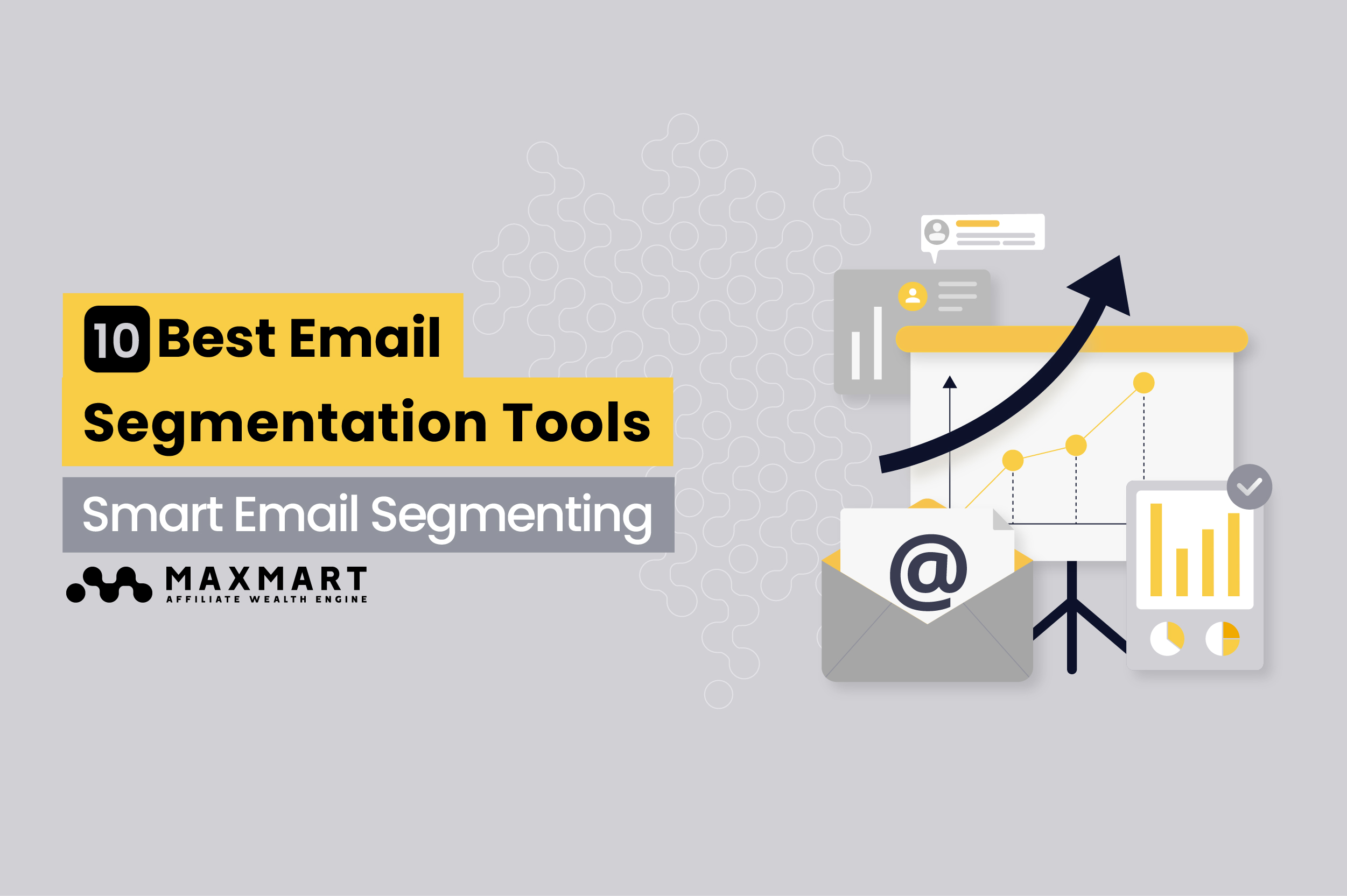Email segmentation has become a cornerstone of effective email marketing in 2025. By dividing audiences into targeted groups, businesses can deliver personalized content that drives engagement and conversions. According to a recent study, segmented email campaigns generate 760% more revenue than generic ones.
In today’s competitive digital landscape, creating impactful email templates that align with segmented strategies is essential. A well-designed template ensures that your emails are visually appealing, mobile-friendly, and optimized for engagement.
This blog will explore the best email template creators available in 2025, highlighting tools that make crafting professional, segmentation-friendly emails easier than ever.
Why Email Segmentation Matters
Segmented email marketing involves dividing your email list into smaller groups based on shared characteristics like demographics, behavior, or preferences. This approach allows you to deliver tailored, relevant content to each group instead of sending one-size-fits-all messages.
Key Benefits of Email Segmentation:
- Improved Engagement: Segmented emails see higher open and click-through rates because they align with subscriber interests.
- Personalized Customer Experience: Delivering relevant content enhances customer satisfaction and loyalty.
- Better ROI: Focusing on specific audience groups results in more effective campaigns and reduced waste.
Learn how affiliate marketing ROI comes from focusing on specific audience groups, resulting in more effective campaigns and reduced waste.
Key Features to Look for in Email Segmentation Tools
When choosing an email segmentation tool, it’s important to evaluate its features to ensure it meets your marketing needs. Here are the essential features to consider:
1. Advanced Segmentation Options
- Look for tools that allow you to segment based on multiple criteria such as demographics, purchase behavior, location, and engagement history.
- The ability to create dynamic segments that update in real time is a game-changer for staying relevant.
2. Automation and Personalization
- Automation features enable you to trigger personalized emails based on specific actions or milestones, like abandoned carts or birthdays.
- Ensure the tool integrates with your CRM or other platforms for seamless data syncing.
3. Analytics and Reporting
- Choose tools that provide detailed analytics on segment performance, such as open rates, click-through rates, and conversion rates.
- Insights into what works for each segment can help you refine your strategy.
4. User-Friendly Template Design
- A drag-and-drop editor for email templates can save time and simplify creating segmentation-friendly emails.
- Look for tools that offer pre-designed templates optimized for different devices.
5. Scalability
- As your business grows, your email list and segmentation needs will expand. Ensure the tool can handle large lists and complex segmentation without slowing down.
The Best Email Segmentation Tools for 2025: Section your Emails to Perfection
Now that we’ve covered the importance of email segmentation and the features to look for in segmentation tools, let’s dive into the top email template creators of 2025. These tools not only simplify the design process but also offer powerful features to support segmentation strategies, ensuring your emails resonate with every audience segment.
1. Mailchimp
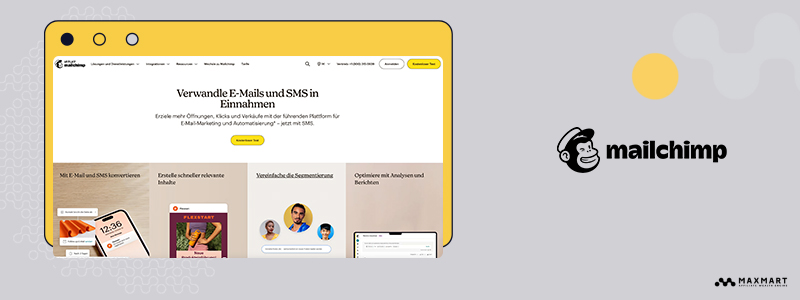
Mailchimp is one of the most popular email marketing platforms, offering a comprehensive suite of tools for businesses of all sizes. Known for its user-friendly interface, Mailchimp provides a robust email segmentation feature that allows marketers to create targeted campaigns based on customer behavior, demographics, purchase history, and more. Its AI-driven recommendations and automation capabilities make it a top choice for personalized email marketing.
Pros
- Powerful Segmentation Tools: Mailchimp supports advanced segmentation, enabling users to create dynamic, real-time updated segments.
- Automation Features: You can trigger emails based on customer actions, such as signing up for a newsletter or abandoning a cart.
- Pre-designed Templates: A library of visually appealing, mobile-responsive email templates makes creating professional campaigns easy.
- Comprehensive Analytics: Mailchimp provides detailed performance insights, including open rates, click-through rates, and revenue tracking.
- Integration Options: Seamless integration with popular apps and platforms like Shopify, WordPress, and Salesforce.
Cons
- Pricing Tiers: While the free plan is a great starting point, advanced features like premium segmentation and A/B testing are locked behind higher-tier plans.
- Limited Customer Support on Free Plans: Free plan users only have access to email support, which might be insufficient for larger teams.
- Steep Learning Curve for Advanced Features: Some advanced tools require time to fully understand and utilize.
Pricing
- Free Plan: $0/month – Up to 500 contacts, basic email segmentation, and templates.
- Essentials Plan: $13/month – More advanced templates and automation tools.
- Standard Plan: $20/month – Includes advanced segmentation and dynamic content.
- Premium Plan: $350/month – All features, including predictive insights and unlimited segmentation.
Verdict
Mailchimp segmentation stands out as a versatile platform that excels in email segmentation and automation. Its combination of ease of use and advanced features makes it a reliable choice for businesses looking to create highly personalized email campaigns. While it may be costlier for access to premium features, the value it offers in terms of segmentation and analytics justifies the investment for serious marketers.
2. HubSpot
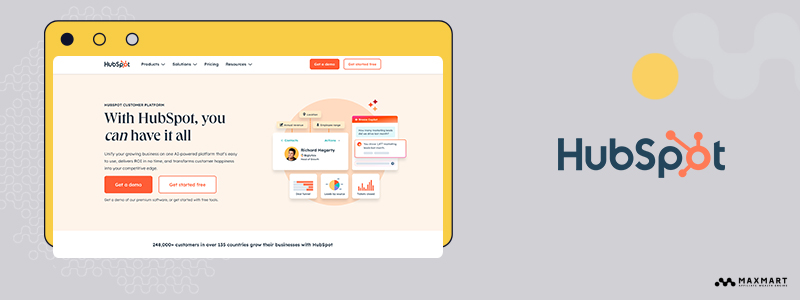
HubSpot is an all-in-one marketing platform renowned for its robust CRM capabilities and email marketing tools. Its email segmentation features are deeply integrated with its CRM, enabling users to create hyper-targeted campaigns based on detailed customer data. What sets HubSpot apart is its ability to combine segmentation, automation, and analytics into one seamless experience. This makes it an excellent choice for businesses looking to streamline their marketing efforts.
Pros
- Deep Integration with CRM: HubSpot’s segmentation tools are powered by rich CRM data, allowing for highly personalized and relevant email campaigns.
- Sophisticated Automation: Create workflows that trigger emails based on customer interactions, lifecycle stages, or specific events.
- Advanced Analytics: HubSpot provides in-depth reporting on email engagement, campaign ROI, and even attribution data.
- Customizable Templates: Access a variety of professional email templates or design your own with a drag-and-drop editor.
- Ease of Use: The intuitive interface makes it easy to manage contacts, segment lists, and track performance, even for beginners.
Cons
- High Cost for Advanced Features: While the free version includes basic email tools, more advanced segmentation and automation require a paid plan.
- Overwhelming for Small Teams: HubSpot’s extensive features can be intimidating for smaller businesses without a dedicated marketing team.
- Limited Customization on Free Plan: The free version has restrictions on template and segmentation options.
Pricing
- Free Plan: $0/month – Includes basic email tools, basic segmentation, and CRM access.
- Starter Plan: $50/month – Adds custom segmentation and more detailed reporting.
- Professional Plan: $890/month – Offers advanced automation, A/B testing, and predictive lead scoring.
- Enterprise Plan: $3,600/month – All features, including advanced reporting and team collaboration tools.
Verdict
HubSpot is ideal for businesses that want an all-in-one marketing solution with exceptional email segmenting capabilities. Its seamless integration between email marketing and CRM data makes it one of the most powerful tools for creating personalized, effective campaigns. Although the higher-tier plans can be costly, the platform’s value for scaling businesses is unmatched. For marketers focused on segmentation and data-driven decisions, HubSpot is a top contender.
3. ActiveCampaign
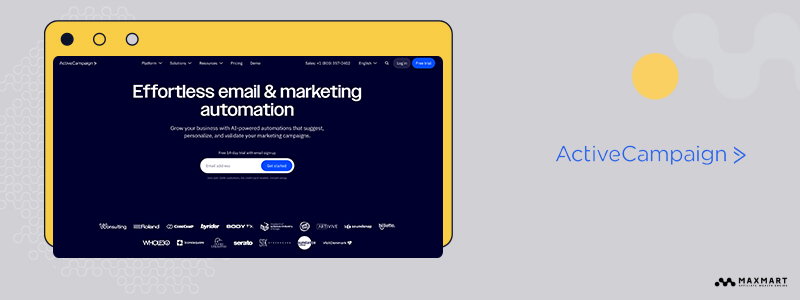
ActiveCampaign is a leading email marketing and automation platform that emphasizes personalization and customer experience. It excels in email segmentation, offering users advanced tools to create dynamic lists based on detailed customer data like purchase behavior, engagement levels, and website activity. Its blend of automation, segmentation, and CRM integration makes it a standout choice for businesses aiming to build highly tailored email campaigns.
Pros
- Advanced Segmentation: ActiveCampaign allows multi-layered segmentation, enabling you to combine multiple criteria for precise targeting.
- Automation Workflows: Automate email sequences triggered by user behavior, such as visiting specific pages or completing forms.
- Integration with CRM: The built-in CRM ensures seamless synchronization of customer data, improving segmentation accuracy.
- Detailed Reporting: Track metrics like open rates, click-through rates, and even goal conversions for each segment.
- Scalable Features: The platform is well-suited for businesses of all sizes, with tools that grow alongside your needs.
Cons
- Complex Setup for Beginners: While powerful, some features like advanced automation workflows require time to master.
- Limited Design Options: The email template editor is functional but less visually versatile compared to competitors like Mailchimp.
- Price Increases Quickly: Costs can escalate for larger contact lists or access to premium features.
Pricing
- Lite Plan: $29/month – Basic segmentation and automation tools, up to 1,000 contacts.
- Plus Plan: $49/month – Includes CRM, lead scoring, and advanced segmentation.
- Professional Plan: $149/month – Adds predictive content, deeper analytics, and custom reporting.
- Enterprise Plan: Custom pricing – Tailored for larger organizations with priority support and unlimited features.
Verdict
ActiveCampaign is a powerful tool for businesses that prioritize email segmentation and automation. Its ability to combine segmentation with behavior-based automation makes it perfect for creating personalized, high-converting campaigns. While the pricing can climb as your needs grow, the platform’s robust features and scalability make it a worthwhile investment for marketers focused on long-term growth and customer engagement.
4. Klaviyo
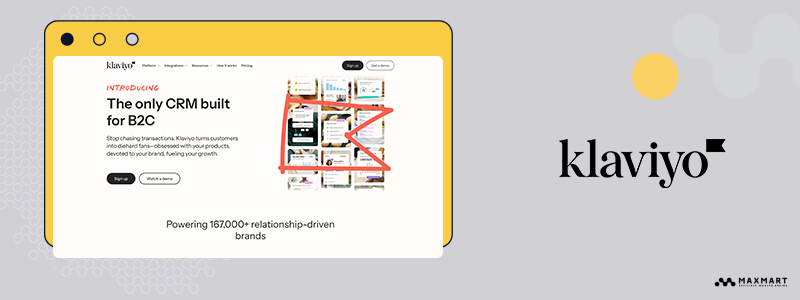
Klaviyo is a data-driven email marketing platform designed with e-commerce businesses in mind. Its email segmentation capabilities are among the most advanced, allowing users to segment their audiences based on real-time customer behavior, purchase history, and website activity. What makes Klaviyo unique is its deep integration with e-commerce platforms like Shopify and Magento, enabling marketers to create hyper-personalized campaigns that drive revenue.
Pros
- E-commerce Integration: Seamless integration with major e-commerce platforms allows for precise segmentation and automation based on shopping behavior.
- Advanced Segmentation Tools: Create detailed segments using data points such as browsing behavior, abandoned carts, and past purchases.
- Pre-Built Templates and Workflows: Klaviyo provides pre-designed workflows like cart recovery and post-purchase emails to save time.
- Actionable Analytics: Gain insights into customer lifetime value, revenue attribution, and segment performance to refine your email segmentation strategy.
- Scalable Features: Handles small startups and large enterprises alike, making it an excellent choice for growing businesses.
Cons
- Higher Cost for Large Lists: Pricing scales quickly as your subscriber base grows, which can be a concern for businesses with large audiences.
- Learning Curve for Beginners: While powerful, Klaviyo’s advanced tools may be overwhelming for marketers new to email segmentation or automation.
- Limited Support on Lower Plans: Email and chat support are restricted on lower pricing tiers, with phone support reserved for higher-tier plans.
Pricing
- Free Plan: $0/month – Up to 250 contacts and 500 email sends per month with basic segmentation.
- Paid Plans: Start at $20/month for 500 contacts and scale based on the number of contacts.
- 1,000 contacts: $30/month
- 5,000 contacts: $100/month
- Custom pricing for larger lists.
Verdict
Kaviyo segmentation is a standout platform for e-commerce businesses looking to leverage email segmentation to its fullest potential. Its deep integration with online stores and real-time behavioral data make it an unmatched tool for creating highly personalized, revenue-driving email campaigns. Although it may be costlier for larger lists, its advanced features and analytics justify the investment for serious e-commerce marketers.
5. Campaign Monitor
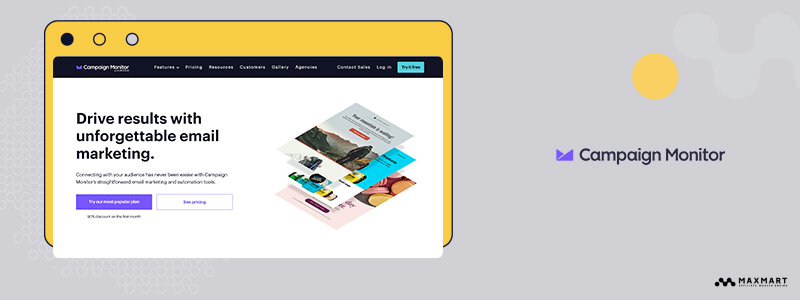
Campaign Monitor is a straightforward and user-friendly email marketing platform with powerful tools for email segmentation and automation. Its emphasis on intuitive design and ease of use makes it accessible for marketers of all skill levels. What sets Campaign Monitor apart is its visually appealing drag-and-drop email editor paired with advanced segmentation tools, perfect for creating highly personalized campaigns with ease.
Pros
- Intuitive Segmentation Tools: Easily create segments based on customer data like demographics, purchase history, or engagement levels.
- Beautiful Templates: Offers a wide variety of professionally designed, mobile-responsive email templates that can be customized without technical skills.
- Advanced Analytics: Provides actionable insights into email performance, including open rates, click-through rates, and ROI for individual segments.
- Scalable Automation Features: Automate email workflows like welcome emails, re-engagement campaigns, and personalized follow-ups.
- Integration-Friendly: Connects seamlessly with tools like Shopify, Salesforce, and WordPress to streamline data collection for segmentation.
Cons
- Limited Advanced Features: Compared to competitors like Klaviyo or HubSpot, Campaign Monitor lacks deeper e-commerce or CRM capabilities.
- Pricing Can Escalate: Costs rise significantly with larger lists, making it less ideal for businesses with substantial contact databases.
- Basic Support on Lower Plans: Priority customer support is available only on higher-tier plans.
Pricing
- Basic Plan: $9/month – Includes core email tools, basic segmentation, and analytics.
- Unlimited Plan: $29/month – Unlocks unlimited emails, advanced segmentation, and automation workflows.
- Premier Plan: $149/month – Adds priority support, advanced analytics, and optimized send times.
Verdict
Campaign Monitor is a great choice for businesses that value simplicity and visually stunning emails. Its combination of user-friendly segmentation tools and attractive templates makes it ideal for marketers who want quick, effective results without sacrificing quality. While it may lack the advanced features of some competitors, it’s an excellent option for small to medium-sized businesses focusing on streamlined, impactful email campaigns.
6. Brevo
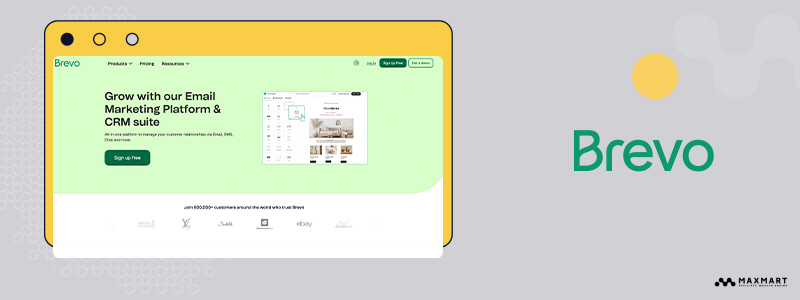
Brevo is an all-in-one marketing platform designed for businesses that need simplicity without sacrificing power. Known for its robust email segmentation capabilities, Brevo makes it easy to create targeted campaigns based on customer behaviors, demographics, or past interactions. Its affordability and multi-channel marketing features, including SMS and chat, make it a favorite among small to medium-sized businesses.
Pros
- Comprehensive Segmentation: Brevo allows users to create precise segments using multiple criteria such as engagement, purchase history, or website activity.
- Multi-Channel Marketing: In addition to email, you can reach customers via SMS and chat, making it a versatile tool for engagement.
- Unlimited Contacts: Unlike most platforms, pricing is based on email volume, not the number of contacts, making it cost-effective for larger lists.
- Advanced Automation: Create custom workflows that trigger emails or SMS messages based on specific customer actions or milestones.
- Simple and Intuitive Interface: The platform is beginner-friendly, with an easy-to-use email editor and straightforward analytics dashboard.
Cons
- Limited Advanced Features: While great for basic segmentation, it lacks some of the sophisticated tools found in platforms like ActiveCampaign or HubSpot.
- Template Design Options Could Be Better: The email template library is functional but less visually diverse compared to competitors like Mailchimp.
- Support Tiers: Priority support is only available on premium plans, which may be frustrating for smaller businesses.
Pricing
- Free Plan: $0/month – Up to 300 emails per day, basic segmentation, and automation for unlimited contacts.
- Starter Plan: $25/month – Up to 20,000 emails per month with no daily limit and advanced segmentation.
- Business Plan: $65/month – Includes advanced automation, A/B testing, and priority support.
- Enterprise Plan: Custom pricing – Tailored solutions with dedicated account managers and advanced features.
Verdict
Brevo is an excellent choice for businesses looking for an affordable, versatile tool with strong email segmentation capabilities. Its ability to combine email, SMS, and chat marketing in a single platform makes it ideal for small to medium-sized businesses aiming to streamline their efforts. While it may not have the advanced features of pricier tools, its flexibility and cost-effectiveness make it a strong contender for marketers focused on maximizing value.
7. Drip
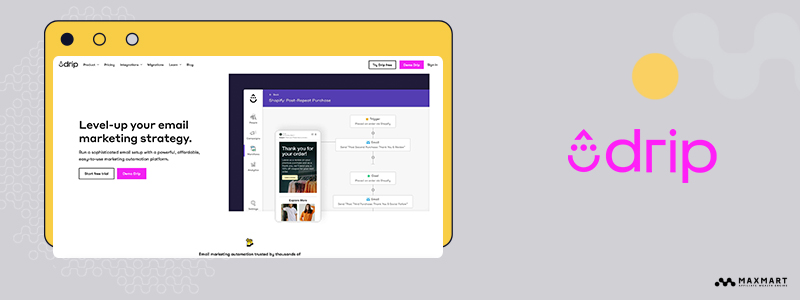
Drip is a powerful email marketing platform tailored specifically for e-commerce businesses. It excels in email segmentation, allowing marketers to create highly detailed and personalized campaigns based on customer actions, purchase history, and engagement behavior. Drip’s seamless integration with e-commerce platforms like Shopify, WooCommerce, and Magento makes it a go-to choice for businesses that rely on deep customer insights to drive sales.
Pros
- Advanced Email Segmentation: Offers dynamic segments that update in real time based on customer behavior, ensuring your campaigns stay relevant.
- Behavior-Based Automation: Automate workflows that are triggered by specific customer actions, such as abandoned carts, product views, or past purchases.
- Integration with E-Commerce Tools: Deep integrations with e-commerce platforms allow for precise data syncing and targeted campaigns.
- Detailed Customer Insights: Access metrics like customer lifetime value, average order value, and engagement scores to optimize segmentation.
- Customizable Email Templates: Includes pre-built, mobile-friendly templates, along with options to design emails from scratch.
Cons
- Steep Learning Curve: While powerful, Drip’s advanced features can be overwhelming for marketers new to segmentation or automation.
- High Pricing for Smaller Businesses: Drip’s cost structure may not be ideal for smaller businesses with limited budgets.
- Limited Template Library: Compared to competitors, the email template selection is more functional than visually diverse.
Pricing
- Basic Plan: Starts at $39/month – Up to 2,500 contacts with all features, including segmentation and automation.
- Larger Plans:
- $89/month for up to 5,000 contacts.
- $154/month for up to 10,000 contacts.
- Custom Pricing: Available for businesses with larger lists or unique needs.
Verdict
Drip is a robust solution for e-commerce businesses that want to leverage advanced email segmentation and automation to boost sales. Its focus on customer insights and e-commerce integrations makes it an exceptional choice for online stores aiming to deliver highly personalized shopping experiences. While its pricing might deter smaller businesses, the features and ROI potential make it well worth the investment for those serious about scaling their email marketing efforts.
8. Marketo
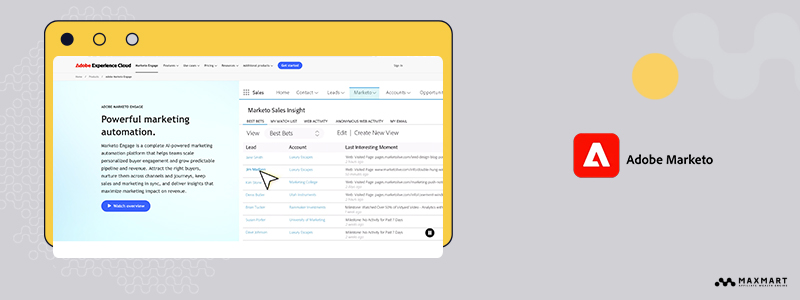
Marketo, part of Adobe’s suite of marketing tools, is a powerhouse platform designed for enterprise-level businesses. Its email segmentation capabilities are among the most advanced in the industry, leveraging robust customer data and predictive analytics to create hyper-personalized campaigns. Marketo stands out for its ability to integrate seamlessly with other Adobe tools, offering a comprehensive solution for large-scale marketing automation.
Pros
- Advanced Segmentation: Marketo allows you to create highly detailed audience segments based on demographics, behavior, and engagement patterns.
- Predictive Insights: Built-in AI and machine learning tools help predict customer behavior and optimize segmentation strategies.
- Scalable Automation: Ideal for large organizations, Marketo supports complex workflows and multi-step automations across channels.
- Comprehensive Analytics: Provides deep insights into campaign performance, lead scoring, and ROI for each segment.
- Seamless Integration: Integrates with Adobe Experience Cloud and other third-party tools for a unified marketing approach.
Cons
- Expensive for Small Businesses: Marketo’s pricing structure is tailored for enterprise users, making it less accessible for smaller companies.
- Steep Learning Curve: Its advanced features can be challenging to navigate without proper training or experience.
- Customization Requires Expertise: While highly flexible, creating custom workflows or templates may require technical skills or developer support.
Pricing
Marketo’s pricing is custom and based on the size of your database and specific requirements. It typically starts at around $1,000/month for smaller databases and scales up for larger organizations and additional features.
Verdict
Marketo is a premier solution for enterprise-level businesses looking to harness the full potential of email marketing segmentation and marketing automation. Its powerful features, predictive analytics, and integrations make it a top choice for companies with complex needs and large-scale campaigns. However, its cost and complexity make it better suited for organizations with dedicated marketing teams and bigger budgets. For businesses aiming for advanced segmentation and data-driven decision-making, Marketo is hard to beat.
9. ConvertKit
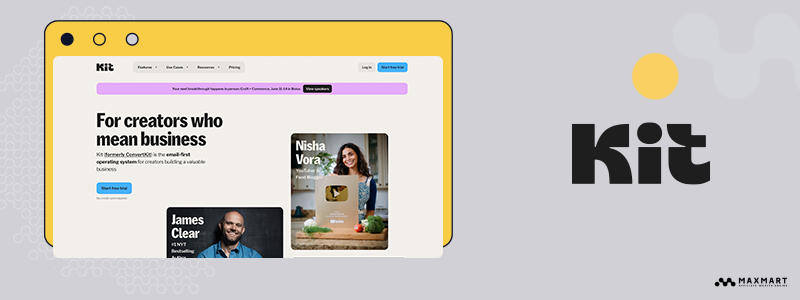
ConvertKit is a popular email marketing platform designed specifically for creators, including bloggers, podcasters, and online educators. Its email segmentation features are simple yet effective, enabling users to organize audiences based on tags, interests, or behaviors. What makes ConvertKit unique is its focus on helping creators build authentic connections with their audiences through personalized, automated campaigns.
Pros
- Tag-Based Segmentation: Instead of traditional list list segmentation, ConvertKit uses tags to segment audiences, making it easy to target subscribers based on specific interests or actions.
- User-Friendly Automation: Create visual workflows to automate email sequences for new subscribers, product launches, or course promotions.
- Creator-Focused Features: Includes tools like content upgrades, landing pages, and opt-in forms specifically designed for creators.
- Simple and Clean Interface: The intuitive dashboard makes it easy to set up and manage campaigns, even for beginners.
- Flat Pricing Structure: Unlimited emails for all plans ensure costs remain predictable as your subscriber base grows.
Cons
- Limited Template Options: The email editor is minimalistic, with fewer design options compared to platforms like Mailchimp or Campaign Monitor.
- Not Ideal for E-Commerce: While excellent for creators, it lacks robust e-commerce integrations and features found in tools like Klaviyo.
- Fewer Advanced Features: Advanced segmentation and analytics tools are less comprehensive than those offered by enterprise-level platforms.
Pricing
- Free Plan: $0/month – Up to 1,000 subscribers, basic email tools, and limited automation.
- Creator Plan: Starts at $15/month – Includes unlimited email sends, tagging, and automation.
- 3,000 subscribers: $49/month
- 10,000 subscribers: $119/month
- Creator Pro Plan: Starts at $29/month – Adds advanced reporting, subscriber scoring, and priority support.
Verdict
ConvertKit is a fantastic choice for creators who want an easy-to-use platform focused on building relationships with their audiences. Its tag-based email segmentation and automation features make it perfect for small businesses and individuals looking to deliver personalized content efficiently. While it may lack the design flexibility and e-commerce features of other platforms, its simplicity and creator-centric tools make it a top pick for content-driven marketing.
10. GetResponse
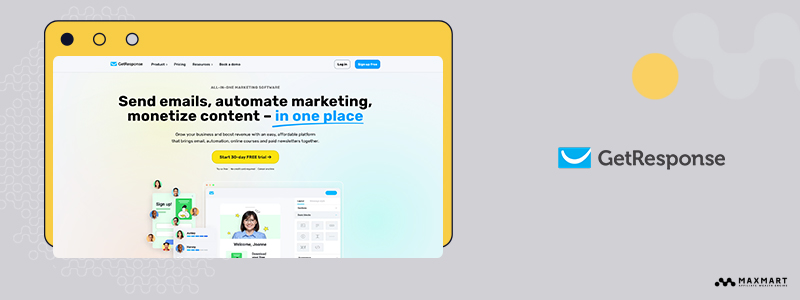
GetResponse is an all-in-one marketing platform that combines email marketing, automation, and website building. It’s particularly well-known for its robust email segmentation capabilities, allowing marketers to target audiences based on a variety of criteria such as demographics, behaviors, and past purchases. What sets GetResponse apart is its scalability and additional features like webinars, SMS marketing, and landing page creation, making it ideal for multi-channel campaigns.
Pros
- Advanced Email Segmentation: Offers dynamic segmentation that adapts to customer actions, ensuring campaigns stay relevant.
- Powerful Automation Features: Create workflows for customer journeys, from welcome emails to re-engagement campaigns.
- Webinar and SMS Capabilities: Built-in tools for hosting webinars and sending SMS campaigns provide multi-channel marketing options.
- User-Friendly Templates: Access a wide range of customizable email templates optimized for mobile and desktop.
- Great Value for Features: Combines email marketing, automation, and additional tools at competitive pricing.
Cons
- Interface Could Be More Intuitive: While feature-rich, the dashboard can feel overwhelming for new users.
- Limited Advanced Features for Free Plan: Many advanced tools like segmentation and automation are locked behind paid tiers.
- Customer Support Variability: Live chat support is not available on the most basic plans, which can frustrate users needing quick help.
Pricing
- Free Plan: $0/month – Up to 500 contacts with basic email tools and limited segmentation.
- Email Marketing Plan: Starts at $19/month – Up to 1,000 contacts with advanced segmentation and unlimited email sends.
- Marketing Automation Plan: Starts at $59/month – Includes advanced workflows, segmentation, and webinar tools.
- E-Commerce Marketing Plan: Starts at $119/month – Adds e-commerce integrations and advanced campaign optimization features.
Verdict
GetResponse is a versatile platform that excels in email segmentation and multi-channel marketing. Its combination of email automation, segmentation, and unique features like webinars makes it an excellent choice for businesses that want an all-in-one solution. While the interface may take time to master, the platform’s affordability and feature set make it a valuable tool for marketers looking to expand their reach and personalize their campaigns effectively.
Conclusion
Email segmentation is more than a marketing tactic—it’s a strategy for building meaningful connections with your audience. By sending the right message to the right people, segmentation increases open rates, drives conversions, and boosts ROI. Choosing the right tool for email segmentation ensures that your efforts are effective, scalable, and aligned with your business needs.
To get started, explore free trials of the tools reviewed here. Test their features, evaluate your goals, and find the perfect fit for your email marketing strategy. Taking that first step can make all the difference in creating campaigns that resonate with your audience.
At MaxMart, we’re dedicated to empowering you with the knowledge and resources to establish a meaningful online presence and drive traffic effectively. As a glamour-free affiliate marketing educational resource, we offer honest, actionable insights to help you succeed.

